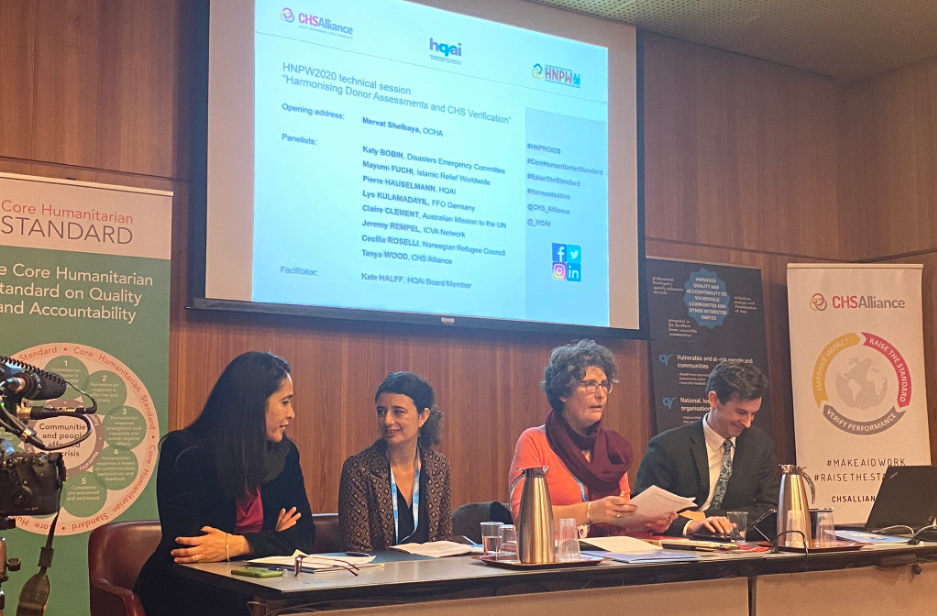Towards Grand Bargain Commitment 4: harmonising donor assessments & CHS Verification
In recent years, it would seem that demands on partnership capacity assessments and due diligence processes have increased, especially with the rigour of more in-depth PSEAH due-diligence processes. Yet Core Humanitarian Standard (CHS) verification could hold potential to support the drive for harmonisation of partnership agreements, saving time and avoiding duplication in operations.
Bringing together donors and NGOs at Humanitarian Networks and Partnerships Week (HNPW) 2020, the CHS Alliance and HQAI held an interactive discussion on how CHS verification can cover a substantial amount of donor partner capacity assessment requirements and due diligence checks, without donors needing to compromise rigour.
Mervat Shelbaya, Head, Inter-Agency Standing Committee (IASC) Secretariat opened the meeting reflecting on the current state of the humanitarian sector:
“With global humanitarian needs at record levels, it becomes more vital than ever that we cut duplication and management costs wherever we can. Yet we know this cannot be at the expense of keeping affected people at the heart of all that we do. I know first-hand, from my position in OCHA, that putting the people receiving our services in the driver’s seat of humanitarian action is the only way to ensure aid is really effective and relevant.”
Call to save time and avoid duplication
Experts in humanitarian financing, from the International Council of Voluntary Agencies (ICVA) and the Norwegian Refugee Council (NRC) set the scene, reminding participants of the background to 2016’s Grand Bargain Commitment 4, where aid organisations and donors committed to harmonise partnership agreements to save time and avoid duplication in operations.
“It is healthy for an organisation to look regularly at systems within our organisation by external audits to comply with donor requirements – but it is costly” says Cecilia Roselli, Head of Partnership and Humanitarian Policy Unit, NRC.
“Doing it well at the beginning of the project cycle – already at the partner assessment stage – is important for harmonisation and simplification of reporting in a later stage.” Jeremy Rempel, Head of Humanitarian Financing, ICVA.

From left: Mervat Shelbaya (IASC), Cecilia Roselli (NRC), Kate Halff (HQAI Board member), Jeremy Rempel (ICVA)
CHS verification for simplification
Tanya Wood, Executive Director, CHS Alliance outlined the Core Humanitarian Standard (CHS) and it’s Nine Commitments that organisations and individuals involved in humanitarian response can use to put communities and people affected by crisis at the centre of humanitarian action. Tanya went on to underline that the CHS is the result of a global consultation process, drawing together key elements of existing humanitarian standards and commitments.
Pierre Hauselmann, Executive Director, HQAI followed by explaining how the CHS was designed so that its application can be measured. Measuring performance through the CHS verification scheme helps organisations learn the extent to which accountability standards have been incorporated into their work and highlights which areas they may consider improving. Independent verification and certification against the CHS undertaken by HQAI provides a detailed picture of the degree to which organisations have successfully implemented the CHS, as well as providing a road map for making improvements.
“HQAI has compared certification audits against the CHS with donor partner assessments – in one example we found that 85% of the questionnaire could be answered by the CHS audit. A clear potential for CHS verification to harmonise and simplify donor partner assessments.” Pierre Hauselmann, Executive Director, HQAI.
Sharing current examples
Donors and NGOs discussed how donors’ recognition of CHS verification could be an effective enabler of their joint commitment to harmonise and simplify reporting requirements, while ensuring accountable aid.
Panellists and audience members alike shared varied examples of CHS verification already saving time and avoiding duplication:
“Shortened versions of partner capacity assessments are available for CHS verified organisations as an incentive” shared Lys Kulamadayil, Germany Federal Foreign Office.
“From a Programme perspective, no other due diligence process has surpassed the robustness and rigorousness of CHS verification, which are assessed by credible, experienced auditors” Mayumi Fuchi, Global Programme Accountability Lead, Islamic Relief Worldwide.
“The discussion is happening between donors in different working groups, but it is an incredible complex and technical process when you go deeper” says Claire Clement, Humanitarian Adviser, Australian Mission to the UN.
“Since 2017 CHS verification is a requirement for DEC. CHS indicators are part of the reporting template to DEC” says Katy Bobin, DEC.
“We were changed by CHS certification with HQAI” reflected Prem Livingstone, EFICOR India. “In the thousands of remote villages where we work, people now know how to complain.”

From left: Mayumi Fuchi (IRW), Claire Clement (DFAT Australia), Kate Halff (HQAI Board member), Katy Bobin (DEC), Lys Kulamadayil (GFFO)
Join the bold
More than 100 aid organisations have undertaken or are in the process of undergoing CHS verification, demonstrating the sector’s huge commitment to creating a culture of accountability.
More donors (governments, UN and INGOs) need to be bold and use the CHS to increase the sector’s effectiveness and efficiency through harmonisation and simplification of their partner assessments.
Do you agree?
This meeting kicked off a CHS Alliance review into the application of donor Partner Capacity Assessments (PCAs) by UN and government donors when they assess the eligibility of organisations receiving humanitarian funding or grants. We are also exploring the potential for aligning several of the current PCA requirements of government donors under one recognised quality assurance standard: the CHS with its well established Nine Commitments.
We want to hear your views about what has changed with donor PCAs since the Grand Bargain of 2016, and if you see potential for greater PCA alignment with the CHS saving time and resources.
